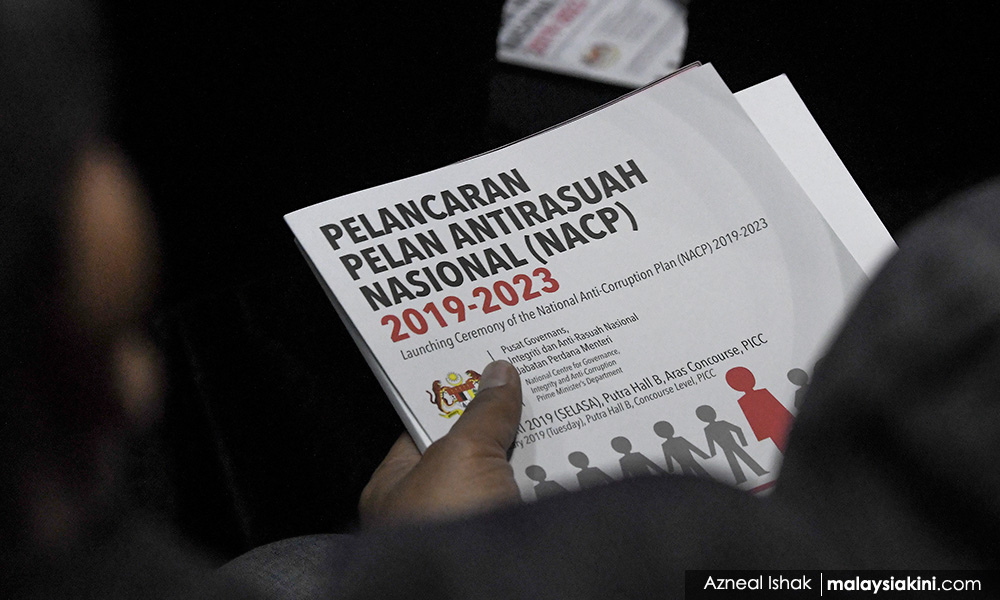
Interference of politicians in government administration and finance is among the key issues facing Malaysia in the fight against corruption.
This was revealed in the National Anti-Corruption Plan (NACP) 2019-2023 document that was launched by Prime Minister Dr Mahathir Mohamad today.
It said that politicians have interfered in administrative (and financial) matters to serve their own interests at the expense of the rules and regulations.
“Such interferences happen in decision-making processes, especially those involving procurement, job appointment and legal system,” it said.
According to MACC, a majority of such cases reported from 2012 until 2014, are from the construction sector’s procurement, like negotiations with middlemen.
The document also revealed that lack of leadership and political will had affected the sustainability and effectiveness of the anti-corruption initiatives undertaken thus far.
“Most, if not all, corruption-deterrent initiatives are either late, slow or unpopular to be implemented,” it said
Several outstanding initiatives which were announced during the last administration) that are still pending implementation include transparency in asset declarations and gift management policy by members of the Administration (including Prime Minister and Deputy Prime Minister); the setting up of an independent agency in managing seized and forfeited assets; the initiation of proper guidelines for lobbyists; and demarcation of power between ministers and secretary-generals.
It said the independence of legislation and enforcement agencies needed to be strengthened, and eventually they must be transformed into independent entities with full power to execute their functions.
“The MACC, for instance, must be allowed to execute its functions independently and effectively without any political interference. Political interference in the 1Malaysia Development Bhd (1MDB) and Felda scandals had been among the biggest obstacle to the MACC and AGS executing their functions between 2015 and 2016,” it said.
It said the situation had created administrative chaos which then led to a reshuffling of the MACC’s top management.

The document stated that the light punishment imposed on corruption offenders as provided under the MACC Act 2009 (Act 694) of imprisonment for a term not exceeding 20 years without setting the minimum number of days for imprisonment, made the law insensible.
"It is outdated and needs to be amended,” said the report.
According to the report, the rampant corruption in politics and the government had aggravated inequality in terms of income, wealth and opportunity.
“The real impact of corruption include rising living costs, declining purchasing power, power imbalances, effect on wages and growth, and increased crime rates, made worse by the increase in public debt and in leakages due to misgovernance of public funds,” it said.
It said there was no denying that Malaysia had adequate legislation, but unfortunately, its enforcement was far below expectation, adding that monitoring and enforcement were essential to ensure all processes and procedures comply with the existing legal framework.
This lack of monitoring and enforcement can be attributed to the lack of resources, namely manpower, skills, technology, methods and financial resources, it said
Another key issue facing Malaysia in fighting corruption, it said, was limited adoption of technology.
Technology changes must be taken into consideration by the government to ensure the role of technology is strategically embedded within the effort to increase government integrity, accountabilty and transparency, it said.
The report also cited lack of public support and confidence as another key issue facing Malaysia in fighting corruption.
“Corruption diminishes public support, hence hamper the government’s ability to fulfil its duty in ensuring conducive services and development for the people. Despite enforcement agencies’ striving to offer their best services, their credibility has always been questioned,” it said
Another factor is the geographical position of the country, where it shares both land and maritime boundaries with several countries.
It said border control and entry point officers have had a history of lack of integrity in the recent past.
“As enforcement weakens, illicit transnational activities along the common borders become rampant, hence pose a major threat to Malaysia’s national security and sovereignty in terms of terrorism and organised crimes,” it said.
According to the report, based on the corruption trend in Malaysia over the five years (2013-2018), the public sector has been the most vulnerable to corruption. Compared to the vulnerability rate of 17.06 per cent in the private sector, the public sector showed a more alarming rate of 63.30 per cent.
NACP was one of the 61 initiatives decided upon from the five meetings of the Cabinet Committee on Anti-Corruption since the formation of the Pakatan Harapan government, which aimes to shut down space and opportunity for anyone involved in corruption.
— Bernama



No comments:
Post a Comment
Note: Only a member of this blog may post a comment.